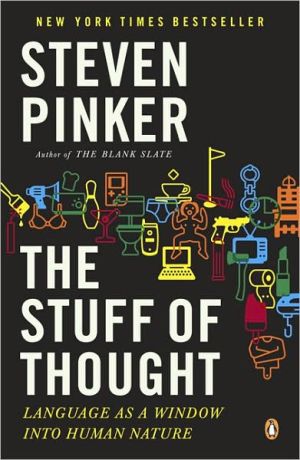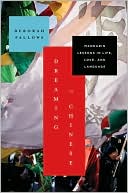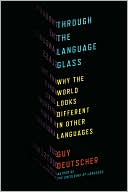Stuff of Thought: Language as a Window into Human Nature
This New York Times bestseller is an exciting and fearless investigation of language\ Bestselling author Steven Pinker possesses that rare combination of scientific aptitude and verbal eloquence that enables him to provide lucid explanations of deep and powerful ideas. His previous books-including the Pulitzer Prize finalist The Blank Slate?have catapulted him into the limelight as one of today's most important popular science writers. In The Stuff of Thought, Pinker presents a fascinating...
Search in google:
Every time we swear, we reveal something about human emotions. When we use an innuendo to convey a bribe, threat, or sexual come-on (rather than just blurting it out), we disclose something about human relationships. Our use of prepositions and tenses tap into peculiarly human concepts of space and time, and our nouns and verbs tap into mental models of matter and causation. Even the names we give our babies, as they change from decade to decade, have important things to day about our relations to our children and to society. By looking closely at our everyday speech-our conversations, our jokes, our legal disputes-Pinker paints a vivid picture of the thoughts and emotions that populate our mental lives. Pinker takes on both scientific questions-like whether language affects thought, and which of our concepts are innate-and questions from the headlines and everyday life. Why does the government care so much about dirty words? How do lobbyists bribe politicians? Why do romantic comedies get such mileage out of the ambiguities of dating? Why do so many courtroom dramas hinge on disagreements about who really caused a person's death? Why have the last two American presidents gotten into trouble by the semantic niceties of their words? And why is bulk email called spam? The Stuff of Thought marries the two topics of Pinker's earlier bestsellers: language (The Language Instinct, Words and Rules) and human nature (How the Mind Works, The Blank Slate). It presents entirely new material, while written in the style that made those books famous: lucid explanations of deep and powerful ideas, presented with irreverent wit, elegant style, and a deft use of examples from popular culture and everyday life. The Washington Post - Johah Lehrer "In The Stuff of Thought, Pinker pitches himself as the broker of a scientific compromise between "linguistic determinism" and "extreme nativism." ... He advocates the middle ground of "conceptual semantics," in which the meaning of our words depends on an underlying framework of basic cognitive concepts. ... Pinker tries hard to make this tour of linguistic theory as readable as possible. ... But profanity from Lenny Bruce can't always compensate for the cryptic vocabulary and long list of competing 'isms. ... The Stuff of Thought concludes with an optimistic gloss on the power of language to lead us out of the Platonic cave, so that we can "transcend our cognitive and emotional limitations." It's a nice try at a happy ending, but I don't buy it. The Stuff of Thought, after all, is really about the limits of language, the way our prose and poetry are bound by innate constraints we can't even comprehend."
Preface viiWords and Worlds 1Down the Rabbit Hole 25Fifty Thousand Innate Concepts (and Other Radical Theories of Language and Thought) 89Cleaving the Air 153The Metaphor Metaphor 235What's in a Name? 279The Seven Words You Can't Say on Television 323Games People Play 373Escaping the Cave 427Notes 441References 459Index 483
\ From Barnes & NobleCognitive scientist Steven Pinker has a publishing history that stretches back to the mid-'80s, but it was his 1994 book, The Language Instinct, that marked him as a major public intellectual. In The Stuff of Thought, he returns to questions about language; in Pinker's words, "how a mind that evolved to think about rocks and plants and enemies can invent physics and math." As in all his writings, he translates his advanced ideas about evolutionary psychology into real-world examples accessible even to general readers. The Harvard professor's theories of language and mind have far-reaching implications for scientist and philosophers, but his discussions here about semantic wars and metaphor battles can fascinate all of us. A major book by one of the world's most influential public intellectuals.\ \ \ \ \ William Saletan…Pinker's nature turns out to be the book's organizing principle. The linguistic arcana, the academic squabbles, the Tom Lehrer songs, the Lenny Bruce quotations—they're all part of the tale of one man's journey to understanding human nature. The majesty of Pinker's theories is only one side of the story. The other side is the modesty of how he built them. It all makes sense, when you look at it the right way.\ —The New York Times\ \ \ Johah Lehrer"In The Stuff of Thought, Pinker pitches himself as the broker of a scientific compromise between "linguistic determinism" and "extreme nativism." ... He advocates the middle ground of "conceptual semantics," in which the meaning of our words depends on an underlying framework of basic cognitive concepts. ... Pinker tries hard to make this tour of linguistic theory as readable as possible. ... But profanity from Lenny Bruce can't always compensate for the cryptic vocabulary and long list of competing 'isms. ... The Stuff of Thought concludes with an optimistic gloss on the power of language to lead us out of the Platonic cave, so that we can "transcend our cognitive and emotional limitations." It's a nice try at a happy ending, but I don't buy it. The Stuff of Thought, after all, is really about the limits of language, the way our prose and poetry are bound by innate constraints we can't even comprehend."\ —The Washington Post\ \ \ \ \ Publishers WeeklyUnless you have a reasonably good background in linguistics, you'll find this excellent book much easier to read than to listen to. Olsher is not to blame; he reads clearly and at a (slightly rapid) conversational speed. Pinker aims for the educated lay reader, using wit and popular metaphor to clarify his meanings and bring abstruse linguistic concepts to life. But his sentences are dense; you need to reread them and think them through. And the jargon, though clearly defined, requires time and thought to absorb: "Though hypernyms are not really examples of polysemy the way metonyms are, their use in emotionally tinged speech is another illustration of how choice among words can make a psychological difference." Such sentences are followed by clarifying illustrations, but they require cogitation-work that is well rewarded by a deeper and more complex understanding of language as a window into the mind. The chapter on the semantics of swearing is particularly fun and enlightening. In every culture swear words concern gods, diseases, excretions and sex, and Pinker tells us why. A person with some knowledge of linguistic theory will enjoy this audio enormously; a person without it will be enriched and delighted by the book, but have great difficulties with the audio version. Simultaneous release with the Viking hardcover (Reviews, May 21). (Sept.)\ Copyright 2007 Reed Business Information\ \ \ \ \ Douglas HofstadterEngaging and provocative . . . filled with humor and fun.\ — Los Angeles Times\ \ \ \ \ The Boston GlobePinker is not only wonderfully clear; he is also blessedly witty.\ \ \ \ \ Kirkus ReviewsConsider the lexicon, Watson: The words a person uses tell you who that person is. Language shapes thought; language, at least in some senses, is thought. How words relate to thoughts is the object of semantics, which, writes Pinker (Psychology/Harvard; The Blank Slate: The Modern Denial of Human Nature, 2002, etc.), "is about the relation of words to reality-the way that speakers commit themselves to a shared understanding of the truth, and the way their thoughts are anchored to things and situated in the world." Of course, there is one planet but many different worlds, and so there are many different truths. Or are there? Pinker considers many cases, including the one in which George Bush lied-maybe-when he claimed that "the British government has learned that Saddam Hussein recently sought significant quantities of uranium from Africa." Learn, Pinker points out, is a factive verb: It requires a degree of certainty that does not attend to semantically allied verbs such as think, so that when Bush used it, "he was committing himself to the proposition that the uranium seeking actually took place, not that the British government believed it did." Were we more certain about what goes inside Bush's brain, we could call it a lie pure and simple, but the brain is a curious thing, capable of equating and uniting "events that have nothing in common," such as, perhaps, reality and politics. Pinker's narrative makes for an advanced textbook in semantics and linguistic theory, and none too lightly worn; each page is a challenge, full of packed sentences that require careful reading ("Several experiments have shown that people distinguish causal chains that exemplify different force-dynamicinteractions even when they are logically equivalent"). Yet Pinker writes clearly and has an eye for meaningful real-world examples such as the "Prenup Paradox" to bring his points home. Call it continuing education for brain owners, an instruction manual on how thought works-and how to think better. Agent: John Brockman/Brockman, Inc.\ \








